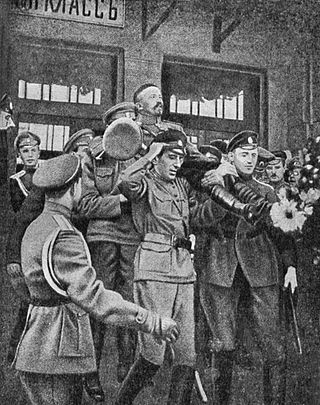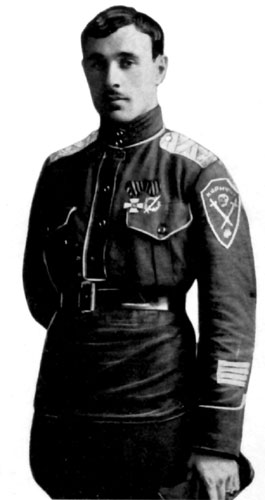Kornilov and Kornilova is a common Russian surname derived from the baptismal name Kornil. Notable people with this surname include:

Lavr Georgiyevich Kornilov was a Russian military intelligence officer, explorer, and general in the Imperial Russian Army during World War I and the ensuing Russian Civil War. Kornilov was of Siberian Cossack origin. Today he is best remembered for the Kornilov Affair, an unsuccessful endeavor in August/September 1917 that was intended to strengthen Alexander Kerensky's Provisional Government, but which led to Kerensky eventually having Kornilov arrested and charged with attempting a coup d'état, and ultimately undermined Kerensky's rule.

The Kornilov affair, or the Kornilov putsch, was an attempted military coup d'état by the commander-in-chief of the Russian Army, General Lavr Kornilov, from 10 to 13 September 1917, against the Russian Provisional Government headed by Aleksander Kerensky and the Petrograd Soviet of Soldiers' and Workers' Deputies. The exact details and motivations of the Kornilov affair are unconfirmed due to the general confusion of all parties involved. Many historians have had to piece together varied historical accounts as a result.

Pavel Stepanovich Nakhimov was a Russian Admiral in the Imperial Russian Navy known for his victory in the Battle of Sinop and his leadership in the Siege of Sevastopol (1854–1855) during the Crimean War.

The White movement, also known as the Whites, was a loose confederation of anti-communist forces that fought the communist Bolsheviks, also known as the Reds, in the Russian Civil War (1917–1923) and that to a lesser extent continued operating as militarized associations of rebels both outside and within Russian borders in Siberia until roughly World War II (1939–1945). The movement's military arm was the White Army, also known as the White Guard or White Guardsmen.

The Russian Republic, referred to as the Russian Democratic Federal Republic in the 1918 Constitution, was a short-lived state which controlled, de jure, the territory of the former Russian Empire after its proclamation by the Russian Provisional Government on 1 September 1917 in a decree signed by Alexander Kerensky as Minister-Chairman and Alexander Zarudny as Minister of Justice.

Admiral Mikhail Petrovich Lazarev was a Russian fleet commander and an explorer.

Mikhail Vasilyevich Alekseyev was an Imperial Russian Army general during World War I and the Russian Civil War. Between 1915 and 1917 he served as Tsar Nicholas II's Chief of Staff of the Stavka, and after the February Revolution, was its commander-in-chief under the Russian Provisional Government from March to May 1917. He later played a principal role in founding the Volunteer Army in the Russian Civil War and died in 1918 of heart failure while fighting the Bolsheviks in the Volga region.
Stepanov (Степанов), female Stepanova is a common Russian and Serbian surname that is derived from the male given name Stepan and literally means Stepan's. The Latvianized form is Stepanovs. Notable people with the surname include:

Vladimir Alexandrovich Antonov-Ovseenko, real surname Ovseenko, party aliases 'Bayonet' (Штык) and 'Nikita' (Ники́та), literary pseudonym A. Gal, was a prominent Bolshevik leader, Soviet statesman, military commander, and diplomat.

Nikolai Vladimirovich Skoblin was a general in the White Russian army, a senior operative in the émigré expatriate Russian All-Military Union (ROVS) and a recruited Soviet spy, who acted as an intermediary between the NKVD and the Gestapo in the Tukhachevsky affair and was instrumental in the abduction of the ROVS chairman Gen Yevgeny Miller in Paris in 1937. He was married to the Russian singer Nadezhda Plevitskaya. A number of important details about his cooperation with the USSR′s intelligence agencies as well as exact circumstances of his death have remained controversial and contested.
Vladimirov or Vladimirova is a Russian and Bulgarian surname, that is derived from the male given name Vladimir and literally means Vladimir's.
Yefimov, sometimes spelled Efimov, or Yefimova is a Russian last name and may refer to:
Golubev or Golubeva is a Russian last name, derived from the Russian word голубь. It may refer to:
Belov, or Belova, is a common Russian surname, derived from the word Bely. Notable people with the surname include:
Zubkov is a Russian masculine surname, its feminine counterpart is Zubkova. It may refer to

Vice Admiral Vladimir Alexeyevich Kornilov was a Russian naval officer who took part in the Crimean War and is known for his battle against the Pervaz-ı Bahrî in what is considered the first battle between steam ships.

The Volunteer Army was a White Army active in South Russia during the Russian Civil War from 1917 to 1920. The Volunteer Army fought against Bolsheviks and the Makhnovists on the Southern Front and the Ukrainian War of Independence. In 1919 it was made part of the Armed Forces of South Russia, becoming the largest force of the White movement until it was merged with the Army of Wrangel in March 1920.
Komarov is a Russian masculine surname, its feminine counterpart is Komarova. It may refer to:
Vladimir Trofimovich Kornilov was a Soviet footballer who played as a goalkeeper in the 1950s.
This page is based on this
Wikipedia article Text is available under the
CC BY-SA 4.0 license; additional terms may apply.
Images, videos and audio are available under their respective licenses.









